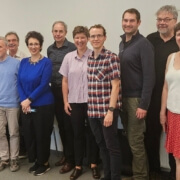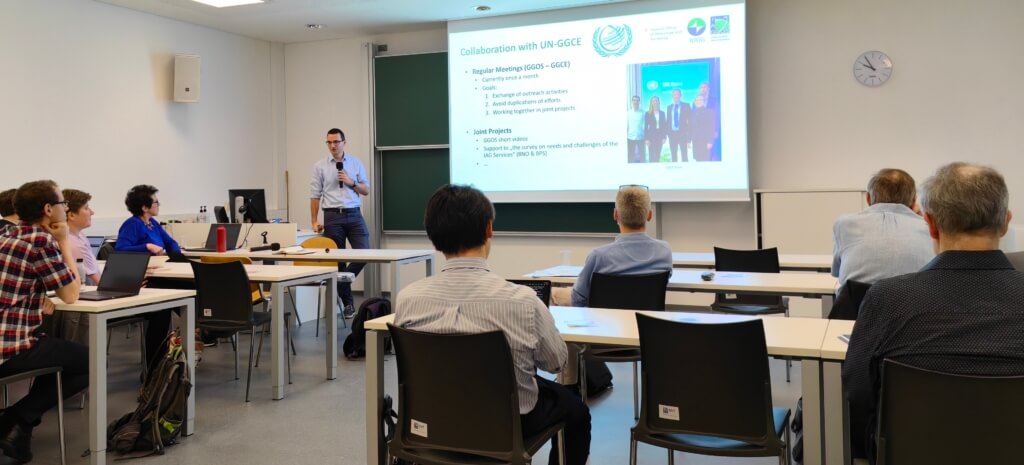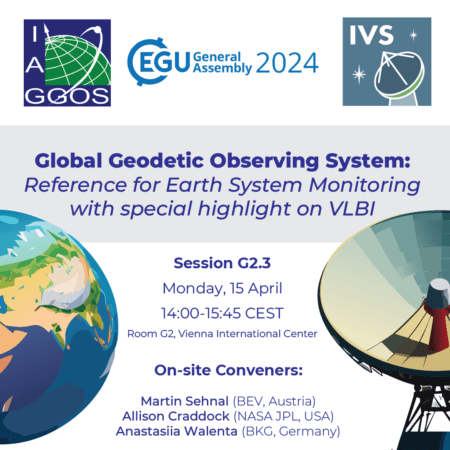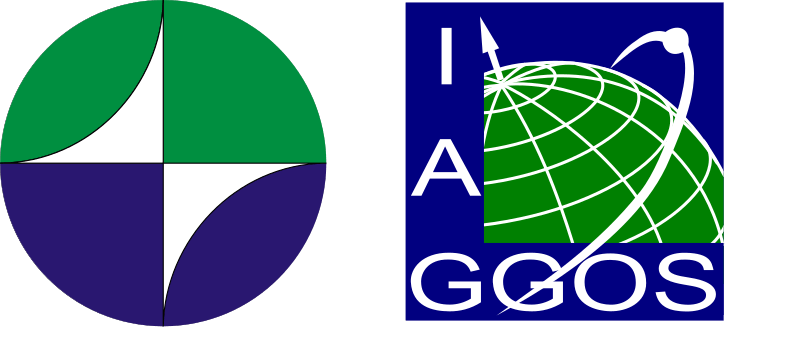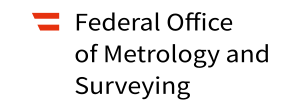GGOS at EGU 2024
GGOS Splinter Meetings at the EGU2024
GGOS recently held business meetings with its Governing Board and Bureaus just before the EGU2024 General Assembly on Sunday, 14 April at the Vienna University of Technology (TU Wien). These meetings were key to discuss important plans, setting priorities, and working together within the geodesy community (Meeting website: https://ggos.org/event/ggos-governing-board-bureaus-meetings/).
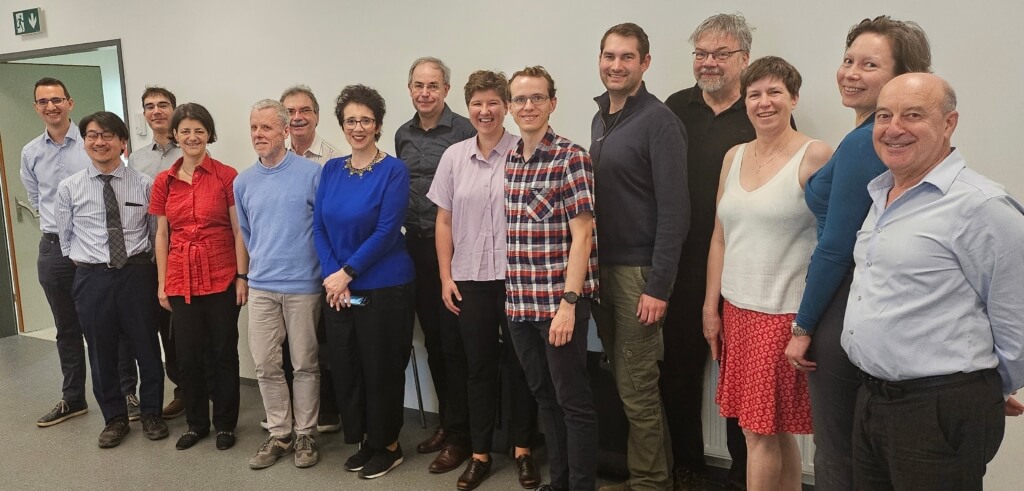
Some of the in-person participants of the GGOS meetings on April 14, 2024. (Photo: Martin Sehnal – GGOS)
GGOS Governing Board Meeting:
This hybrid meeting was attended by a total of 39 GGOS Governing Board members and guests. Various aspects of GGOS work and future plans were presented and discussed. Here are some of the highlights:
- New leaders for the GGOS Bureau of Networks and Observations (BNO): José Rodríguez (IGN, Spain) and Martin Lidberg (Lantmäteriet, Sweden) were elected as Director and Deputy Director respectively, to continue the activities previously coordinated by Michael Pearlman. The current joint work of José, Martin and Michael is in line with the GGOS commitment to smooth leadership transitions.
- Approval of the GGOS Strategic Plan 2024–2034: All GGOS Governing Board members agreed on a new plan that outlines GGOS goals and strategies for the next decade. This plan helps GGOS to meet new challenges and make progress in geodesy.
- Development of an Implementation Plan: GGOS is developing a detailed plan to translate the strategic goals into action. This plan will ensure that GGOS actions are clear, achievable, and have a timeline to get things done.
- New GGOS Affiliate: GGOS welcomed a new member: GGOS IberAtlantic Affiliate. This demonstrates GGOS’s efforts to work with more partners worldwide.
Meeting of the GGOS Bureau of Products and Standards (BPS):
In this meeting, the chair of the BPS, Detlef Angermann (TUM, Germany), reported on ongoing activities related to the improvement and generalised use of geodetic standards. The main focus of the meeting was the presentation of a White Paper containing a proposal for the definition of Essential Geodetic Variables (EGVs), which are important to make geodetic measurements consistent worldwide and to ensure a better data sharing and awareness of the contribution of geodesy to the observation of the Earth System. This White Paper is currently under internal revision by the GGOS Science Panel. A total of 32 colleagues participated in this hybrid meeting.
Meeting of the GGOS Bureau of Networks and Observations (BNO):
This hybrid meeting, attended by 28 colleagues, focused on the transition of past an new directors and how to improve observing networks and increased collaboration between the different IAG services. Some key points were:
- The role of the Bureau: The importance of the BNO in coordinating observing networks and ensuring data quality was highlighted.
- Committee reports: Updates were given on the work of the various committees under the BNO.
- Service reports: IAG Services reported on recent progress and emphasised their support to geodetic research and applications.
GGOS’s Contribution at EGU2024 General Assembly: Joint Session with VLBI
The joint oral and poster session at the EGU2024, featuring GGOS (Global Geodetic Observing System) and VLBI (Very Long Baseline Interferometry), showcased groundbreaking research and advances in geodetic observations and their applications. Led by Convener Kosuke Heki and Co-Conveners Martin Sehnal, Allison Craddock, Esther Azcue, Anastasiia Walenta, Minghui Xu, and Aletha de Witt, the session attracted a diverse audience of experts and enthusiasts eager to explore the latest developments in Earth system monitoring. (Session website: https://meetingorganizer.copernicus.org/EGU24/sessionprogramme/5232)
Oral Presentations:
- GGOS: Ensuring a Coherent Earth Observation System: Laura Sanchez and colleagues presented the crucial role of GGOS in coordinating global geodetic observations to ensure coherence and reliability in Earth system monitoring.
- The Absolute Gravity Reference Network of Italy: Riccardo Barzaghi and team discussed Italy’s Absolute Gravity Reference Network, highlighting its significance in providing accurate measurements for geodetic research.
- IHRF Coordination Center: Georgios S. Vergos and co-authors presented the newly established IHRF Coordination Center, an initiative to ensure the sustainability of the International Height Reference System (IHRS) and its realization, the International Height Reference Frame (IHRF).
- Modelling Global Crustal Deformations: Henryk Dobslaw and colleagues presented innovative models for simulating global crustal deformations induced by geophysical fluid loading, with implications for space geodetic applications.
- The International DORIS Service: Laurent Soudarin and co-authors provided insights into the challenges and progress of the International DORIS Service, emphasising its critical role in precise orbit determination for satellite missions.
- Metadata Recommendations for Geodetic Data: Kirsten Elger highlighted recommendations for the generation of DOI’s for geodetic data, aiming to improve data interoperability and accessibility.
VLBI Component:
- Optimal Observing Strategy of GENESIS: David Schunck and collaborators discussed the optimal observing strategy of GENESIS in geodetic VLBI experiments to improve spatial resolution and measurement accuracy.
- VGOS Current Status and Prospects: Rüdiger Haas gave an overview of the VLBI Global Observing System (VGOS), highlighting its current status, challenges, and future prospects for advancing geodetic observations.
- Rethinking Operational VGOS Observations: Matthias Schartner and co-authors presented strategies for rethinking operational VGOS observations to optimise data collection and processing methodologies.
- Long-term Geodetic Product Assessment: Shrishail Raut and colleagues discussed the assessment of long-term geodetic products derived from VLBI transmitters on Next-Generation GNSS, offering insights into product reliability and accuracy.
Posters:
A range of posters further enriched the session, covering topics such as the International Association of Geodesy, the GGOS Portal for metadata, updates on CDDIS (Crustal Dynamics Data Information System), and research on sea level variations and trends.
Conclusion:
The joint GGOS/VLBI session provided a comprehensive platform for researchers to share knowledge, discuss challenges and explore innovative solutions in geodetic observations. Presentations and posters underscored the crucial role of GGOS and VLBI in advancing our understanding of Earth system dynamics and facilitating global collaboration in geodetic research.
by Martin Sehnal, Director of GGOS Coordinating Office

